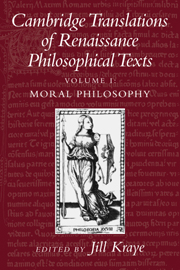Book contents
- Frontmatter
- Contents
- List of Translators
- Preface
- PART I CONCEPTS OF MAN
- PART II ARISTOTELIAN ETHICS AND THE SUPREME GOOD
- PART III ARISTOTELIAN ETHICS AND CHRISTIANITY
- PART IV PLATONIC ETHICS
- PART V STOIC ETHICS
- PART VI EPICUREAN ETHICS
- 20 Petrarch
- 21 Francesco Filelfo
- 22 Cosma Raimondi
- 23 Francisco de Quevedo
- Bibliography of Renaissance Moral Philosophy Texts Available in English
- Index Nominum
- Index Rerum
21 - Francesco Filelfo
Published online by Cambridge University Press: 05 June 2012
- Frontmatter
- Contents
- List of Translators
- Preface
- PART I CONCEPTS OF MAN
- PART II ARISTOTELIAN ETHICS AND THE SUPREME GOOD
- PART III ARISTOTELIAN ETHICS AND CHRISTIANITY
- PART IV PLATONIC ETHICS
- PART V STOIC ETHICS
- PART VI EPICUREAN ETHICS
- 20 Petrarch
- 21 Francesco Filelfo
- 22 Cosma Raimondi
- 23 Francisco de Quevedo
- Bibliography of Renaissance Moral Philosophy Texts Available in English
- Index Nominum
- Index Rerum
Summary
Introduction
The Italian humanist Francesco Filelfo (1398–1481) was born in Tolentino, in the Marches, and spent his early years studying in Padua and Venice. From 1421 to 1427 he was in Constantinople, where he acquired a Byzantine wife, an impressive haul of manuscripts of Greek classical works and a solid knowledge of the Greek language. On his return to Italy, he taught first in Bologna and then moved, in 1429, to Florence, from which he was exiled in 1434 because of his quarrels with Cosimo de' Medici. After a four-year stint at the University of Siena, Filelfo moved to Milan, where he was based for the rest of his long life, aside from a brief period (1475–6) as a highly paid lecturer at the Sapienza in Rome. His long-desired return to Florence was finally achieved in 1481, just a few weeks before his death. Filelfo wrote poetry in Latin, Greek and Italian, produced a number of Latin translations of Greek works (including Xenophon's Cyropaidea, the pseudo-Aristotelian Rhetorica ad Alexandrum and various writings by Plutarch) and was the author of prose dialogues and treatises respected for their humanist erudition and their impressive display of classical Latin style.
Filelfo's Latin correspondence is composed of letters of three kinds: first, those addressed to his peers and colleagues, which discuss matters of ephemeral and anecdotal interest; second, those addressed to princes and patrons, which mostly consist of general reflections on the course of human affairs; and third, those mainly written for posterity, which discuss literary or philosophical issues and are meant to be showpieces of their author's learning and mastery of the Latin language.
- Type
- Chapter
- Information
- Cambridge Translations of Renaissance Philosophical TextsMoral and Political Philosophy, pp. 234 - 237Publisher: Cambridge University PressPrint publication year: 1997

